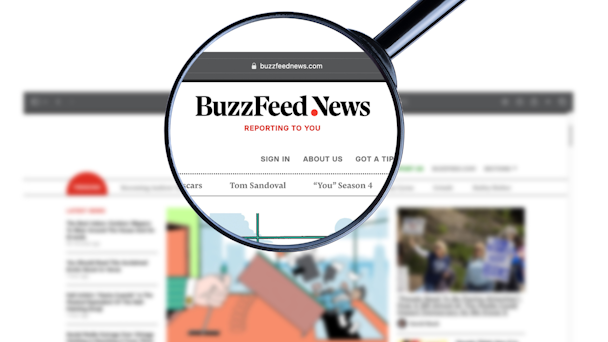BuzzFeed News is dissolved as parent company eyes AI
Some experts say the closure of BuzzFeed’s pioneering news division could foreshadow a broader trend that might soon descend upon the digital news sector.

BuzzFeed News is being shut down as part of its parent company’s broader efforts to reduce spending. / Adobe Stock
BuzzFeed News is shutting down, according to multiple reports citing an internal memo that BuzzFeed co-founder and chief exec Jonah Peretti issued to employees on Thursday. Some media analysts predict that it could be a sign of things to come.
The shuttering of BuzzFeed’s news division is reportedly part of a broader, company-wide effort to cut its workforce by 15%. According to a report from The Washington Post, BuzzFeed’s workforce as of this morning stood at around 1,200 employees, equating to roughly 180 who will be let go.
The company previously implemented layoffs in December, reducing its staff by 12%.
Advertisement
Founded in 2011, BuzzFeed News is widely regarded as a pioneer of digital journalism. The outlet won a Pulitzer Prize in 2021 for its reporting on the Chinese government’s detention of Muslims in the country’s Xinjiang region. It was also lauded for its 2017 publication of the Steele dossier – a political report outlining alleged Russian interference in the 2016 US presidential election.
In his memo to employees, Peretti suggested that some former BuzzFeed News employees may be able to land new positions at online media outlet HuffPost, which was acquired by BuzzFeed from Verizon Media in 2021. (BuzzFeed announced a round of layoffs targeting the HuffPost staff just a few weeks after the acquisition).
BuzzFeed’s chief operations officer Christian Baesler and its chief revenue officer Edgar Hernandez will also be leaving the company, Peretti wrote in the memo.
While Peretti admitted that he’s partially at fault for the layoffs, he also lamented the present state of the media landscape: “I made the decision to overinvest in BuzzFeed News because I love their work and mission so much,” he wrote. “This made me slow to accept that the big platforms wouldn’t provide the distribution or financial support required to support premium, free journalism purpose-built for social media.
Advertisement
“We will concentrate our news efforts in HuffPost, a brand that is profitable with a highly engaged, loyal audience that is less dependent on social platforms,” Peretti wrote in the memo. “We will empower our editorial teams at all of our brands to do the very best creative work and build an interface where that work can be packaged and brought to advertisers more effectively.”
Peretti also gestured at the future direction of the company, writing that, moving forward, BuzzFeed plans to “bring more innovation to clients in the form of creators, AI [artificial intelligence] and cultural moments that can only happen across BuzzFeed [and its subsidiaries:] Complex, HuffPost, Tasty and First We Feast.”
BuzzFeed’s woes reflect a broader trend throughout the tech industry, as companies struggle to stay afloat through swelling inflation and a shaky economy. Meta, for example, announced in November that it would lay off more than 11,000 employees – the company's first major round of job cuts since it was founded in 2004. Twitter has been similarly rocked by layoffs.
Suggested newsletters for you
A harbinger of things to come?
The closure, some experts believe, could foreshadow similar developments across the digital media landscape.
Jack Marshall, a leading media analyst and the co-founder of business media and advisory firm Toolkits, says that today’s news from BuzzFeed is “further evidence of how difficult it can be to sustain original high-quality reporting and journalism with an almost entirely advertising-based model.” Such models, he argues, are “particularly exposed to broader economic fluctuations: economic instability inevitably leads to pullbacks in marketer spending, which has a quick and significant impact on mostly ad-supported publishers.”
Subscription-based models, on the other hand, “typically prove relatively well-insulated by comparison,” Marshall says. "Publishers with diversified revenue streams are better positioned to weather difficult economic conditions as a result.”
Cassie Petrey, chief exec of celebrity social media marketing platform Crowd Surf, feels BuzzFeed has lost its USP in the influencer age. “Buzzfeed was originally known to us for breaking news in a fun, unique way,” she says. “However, social media and the creators on those platforms have kind of taken that spot from them ... This could be why they’re going to lean into creators and AI ... The ways in which people are receiving and sharing news have evolved a lot, and [those are] never going to stop evolving.
“I have a feeling we’ll continue to see different types of pivots from media companies; they’re going to have to continue to evolve quickly if they want to survive.”
Though it’s too soon to draw concrete conclusions about the significance of Peretti’s brief mention of AI in his memo to employees, some believe he intends to leverage the technology – perhaps large language models like OpenAI's GPT-4 – to produce news content. GPT-4 does not demand a salary.
“One reason behind the layoffs is undoubtedly not just cost savings, but the belief that AI will be able to replace some of the work previously done by writers at Buzzfeed News,” says Karsten Weide, principal and chief analyst at market research firm W Media Research.
In a recent interview with podcaster Lex Fridman, MIT physicist and AI researcher Max Tegmark said that "journalism is going to be crushed" by AI. Tegmark is also president of the Future of Life Institute, which recently published an open letter urging a six-month pause on the training of advanced AI, citing existential risks to humanity.
For more on the latest happening in AI, web3 and other cutting-edge technologies, sign up for The Emerging Tech Briefing newsletter here.

